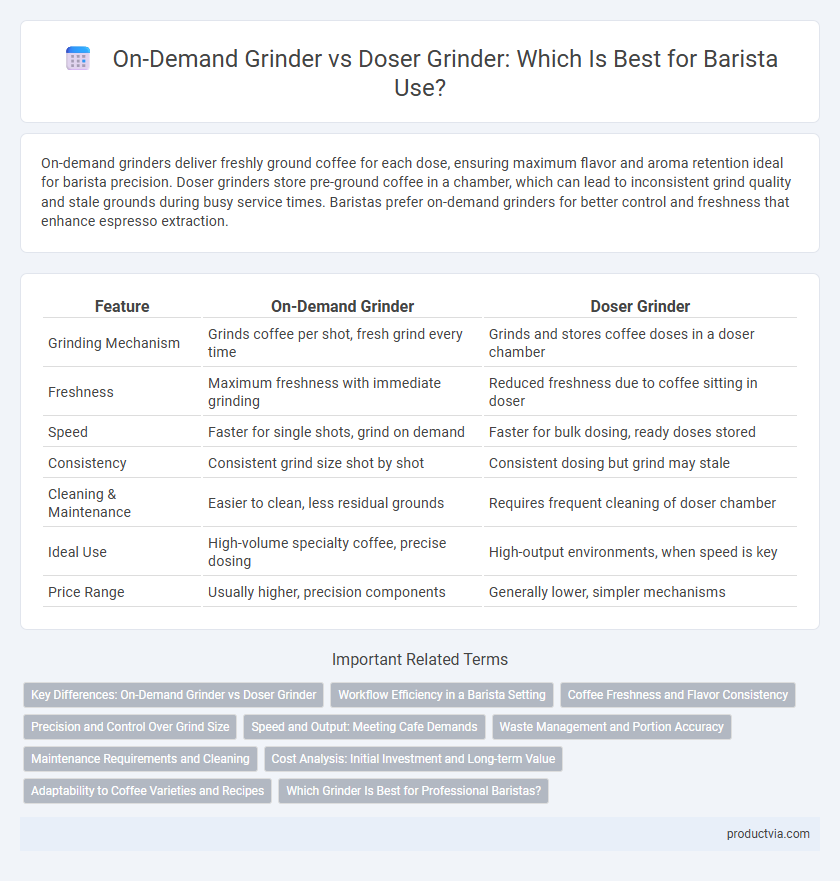On-demand grinders deliver freshly ground coffee for each dose, ensuring maximum flavor and aroma retention ideal for barista precision. Doser grinders store pre-ground coffee in a chamber, which can lead to inconsistent grind quality and stale grounds during busy service times. Baristas prefer on-demand grinders for better control and freshness that enhance espresso extraction.
Table of Comparison
| Feature | On-Demand Grinder | Doser Grinder |
|---|---|---|
| Grinding Mechanism | Grinds coffee per shot, fresh grind every time | Grinds and stores coffee doses in a doser chamber |
| Freshness | Maximum freshness with immediate grinding | Reduced freshness due to coffee sitting in doser |
| Speed | Faster for single shots, grind on demand | Faster for bulk dosing, ready doses stored |
| Consistency | Consistent grind size shot by shot | Consistent dosing but grind may stale |
| Cleaning & Maintenance | Easier to clean, less residual grounds | Requires frequent cleaning of doser chamber |
| Ideal Use | High-volume specialty coffee, precise dosing | High-output environments, when speed is key |
| Price Range | Usually higher, precision components | Generally lower, simpler mechanisms |
Key Differences: On-Demand Grinder vs Doser Grinder
On-demand grinders deliver freshly ground coffee precisely when needed, offering greater control over grind volume and minimizing coffee waste, which is ideal for specialty coffee preparation. Doser grinders store pre-ground coffee in a chamber, allowing for quicker dosing but potentially compromising freshness and grind consistency over time. Baristas seeking precision and quality typically prefer on-demand grinders, while doser grinders suit high-volume settings where speed is prioritized.
Workflow Efficiency in a Barista Setting
On-demand grinders offer baristas precise control over grind time, enhancing workflow efficiency by minimizing coffee waste and enabling consistent dosing tailored to each shot. Doser grinders streamline the process by dispensing pre-measured coffee doses, reducing the time spent grinding during peak hours but may sacrifice flexibility for grind adjustment. Choosing between the two depends on balancing speed and control needs in high-volume versus specialty coffee environments.
Coffee Freshness and Flavor Consistency
On-demand grinders deliver freshly ground coffee for each shot, preserving optimal freshness and allowing baristas precise control over grind size and dose, which enhances flavor consistency. Doser grinders pre-grind and store coffee in a dosing chamber, which can lead to exposure to air and slight flavor degradation over time, impacting freshness. While doser grinders offer speed and convenience, on-demand grinders better maintain coffee's aromatic profile and quality essential for specialty coffee preparation.
Precision and Control Over Grind Size
On-demand grinders offer superior precision and control over grind size by delivering freshly ground coffee directly upon activation, minimizing dose retention and ensuring consistent particle size for each shot. Doser grinders, while convenient for volume, tend to produce less uniform grind sizes due to residual grounds in the dosing chamber, affecting extraction consistency. Baristas seeking meticulous grind control typically prefer on-demand grinders for their ability to fine-tune settings and achieve exact grind calibration shot after shot.
Speed and Output: Meeting Cafe Demands
On-demand grinders provide faster grinding with each dose freshly ground, minimizing wait times and ensuring optimal flavor consistency for high-volume cafes. Doser grinders, featuring preset quantities, offer bulk grinding capabilities that speed up service during peak hours but may sacrifice some freshness. Baristas in busy environments prioritize on-demand grinders for better speed and output alignment with dynamic cafe demands.
Waste Management and Portion Accuracy
On-demand grinders deliver precise coffee doses directly into the portafilter, minimizing coffee waste by grinding only what is needed per shot. Doser grinders accumulate ground coffee in a chamber, which may lead to inconsistent portion sizes and increased waste due to excess coffee spillage or stale grounds. Baristas seeking optimal waste management and portion accuracy often prefer on-demand grinders for their controlled grind delivery and reduced coffee loss.
Maintenance Requirements and Cleaning
On-demand grinders require frequent cleaning of the grinding chamber and chute since coffee grounds accumulate quickly between uses, making maintenance more time-intensive but ensuring fresher grounds. Doser grinders accumulate grounds in a dosing chamber, reducing immediate cleaning needs but necessitating comprehensive cleaning of the doser unit and burrs periodically to prevent stale coffee buildup. Both systems demand regular burr replacement and deep cleaning to maintain optimal grind consistency and hygiene in a professional barista environment.
Cost Analysis: Initial Investment and Long-term Value
On-demand grinders typically have a lower initial investment cost, making them attractive for startups and small cafes, while doser grinders require a higher upfront expenditure due to their complex dosing mechanisms. Long-term value favors doser grinders in high-volume settings, as they offer consistent dosing and reduce coffee waste, enhancing operational efficiency. Baristas benefit from on-demand grinders' precision and control per shot, but doser grinders streamline workflow, potentially lowering labor costs over time.
Adaptability to Coffee Varieties and Recipes
On-demand grinders provide precise control over grind size and dosing for each shot, allowing baristas to easily adjust settings for different coffee varieties and specialty recipes. Doser grinders, with their fixed dosing mechanism, often limit flexibility but ensure consistent portioning, which can be advantageous in high-volume settings. For baristas aiming to experiment and customize profiles based on bean origin and brewing method, on-demand grinders offer superior adaptability and nuanced grind adjustments.
Which Grinder Is Best for Professional Baristas?
On-demand grinders deliver precise coffee dosing with each grind, allowing professional baristas to maintain consistency and freshness for every shot, making them ideal for specialty coffee shops. Doser grinders store ground coffee in a chamber, which can lead to static retention and clumping, potentially affecting flavor quality and portion control. For professional baristas prioritizing accuracy, minimal waste, and optimal taste, on-demand grinders are generally the best choice.
On-demand grinder vs Doser grinder for barista use Infographic

 productvia.com
productvia.com